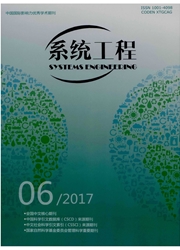

 中文摘要:
中文摘要:
采用对排放征税的减排政策时,如何合理分配排放税收是必须考虑的重要内容。本文构建了一个包含政府与企业以及企业间双重博弈关系的两阶段动态博弈模型,研究了减排目标外生时,基于产出补贴的排放税收返还机制的设计问题。研究表明,当两阶段博弈达到均衡时,基于产出补贴的排放税收返还机制可以满足预算约束;排放税收中返还给企业的比例随着减排难度的提高而增加,随着排放外部性增大而减小;当外生减排目标逐步提高时,社会经济福利水平呈现出先增加后降低的特征。
 英文摘要:
英文摘要:
When tax policy is used to abate emissions, how to redistribute the revenues is one important issue. The paper proposes a two-stage dynamic game model comprising two sub-games which involves government-firm and firm-firm relationship. We investigate the second-best emissions tax and its revenues refunding scheme based on output subsidy with exogenous abatement target. The conclusions are drawn as follows: (1) the output subsidy refunding scheme could meet budget constraints in equilibrium and, the refunding ratio increases with abatement difficulty and decreases emissions damage magnitude; (2) when an exogenous emission reduction target increases gradually, socio-economic welfares present a climb up and then turn down characteristics.
 同期刊论文项目
同期刊论文项目
 同项目期刊论文
同项目期刊论文
 Optimal acquisition strategy for China';s strategic petroleum reserve: A cost estimation study throu
Optimal acquisition strategy for China';s strategic petroleum reserve: A cost estimation study throu Analysis of Global CCS Technology, Regulations and Its Potential for Emission Reduction with Focus o
Analysis of Global CCS Technology, Regulations and Its Potential for Emission Reduction with Focus o Does generation form influence environmental efficiency performance? An analysis of China';s power s
Does generation form influence environmental efficiency performance? An analysis of China';s power s System Analysis Approach for Identification of the Factors Driving Crude Oil Prices after the Global
System Analysis Approach for Identification of the Factors Driving Crude Oil Prices after the Global 期刊信息
期刊信息
